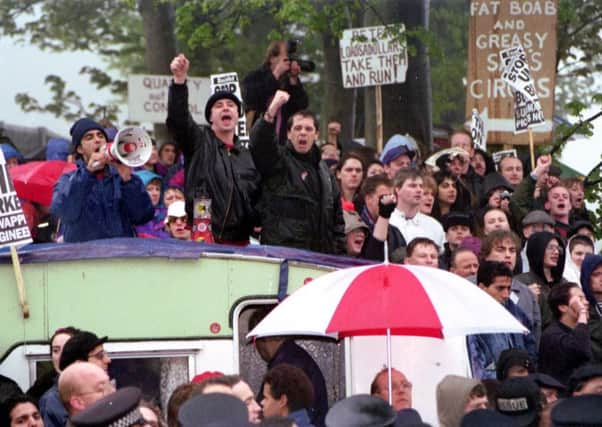Police moles in protest groups under scrutiny


Researchers have received legal aid funding to examine the pervasiveness of police surveillance and whether it also extended to industrial disputes such as the 1993 Timex strike in Dundee and the Pollok Free State’s attempts to block construction of the M77 motorway in Glasgow in the early 1990s.
Justice secretary Michael Matheson rejected calls for a public inquiry into undercover policing earlier this year after the Home Office refused to extend the remit of the England’s judge-led Undercover Policing Inquiry to cover Scotland.
Advertisement
Hide AdAdvertisement
Hide AdCampaigners will take their fight for a judicial review to the Court of Session in July in the hope of having the Scottish Government’s decision overturned.
It follows the publication of a report earlier this year by HM Inspectorate of Constabulary in Scotland (HMICS) which concluded that undercover officers from England crossed the border on the number of occasions between the late 1990s and 2010, including during the G8 summit at Gleneagles in 2005.
The report singled out the activities of notorious undercover officer Mark Kennedy who visited Scotland on at least 17 occasions and carried out “multiple activities” on each visit.
Kennedy is one of a number of operatives who tricked women into sexual relationships, leading to an unreserved apology from the Metropolitan Police in 2015.
Following publication of the HMICS report, Matheson told the Scottish Parliament a separate inquiry north of the border was “not necessary or justified”.
Environmental campaigner Tilly Gifford, who is behind the legal action, said Matheson’s decision was “offensive” to those who had been spied on.
“He saw the HMICS report as a clean bill of health for the police and therefore decided there was no need for an inquiry,” she said. “That was a totally outrageous decision.
“There’s no official counter-voice to the HMICS report, so we’ve commissioned a report from the Undercover Research Group.”
Advertisement
Hide AdAdvertisement
Hide AdThe URG, a band of activist-investigators, is looking for those who believe they have been affected by undercover policing in Scotland since 1968.
Gifford said: “There are a list of groups we think likely to have been affected such as Pollok Free State; campaigners at Faslane and the G8; blacklisted construction workers and those involved in the miners’ strike. These are all groups where people have made allegations against the police. The research is attempting to join the dots to see if there were links between the officers deployed in England and the Scottish police.”
Dónal O’Driscoll, a member of the Research Group, said he hoped the report would be made public after the court case had concluded.
“One part of our work is reaching out to campaigns in Scotland, looking at whether they were targeted by undercover officers,” he said.
“These sort of campaigns definitely fit the profile. We know there was surveillance going on in the Pollok Free State, for example.
“People think this spying only happened on criminal or terrorist groups, but they looked at any form of protest, whether it was peaceful or non-peaceful; there was a really broad remit.”
Matheson said: “I appreciate there is some legitimate public concern about undercover policing activity in Scotland, and I took those concerns into account in reaching a decision. However, on balance, I consider that establishing a separate Scottish inquiry is not a proportionate response.”